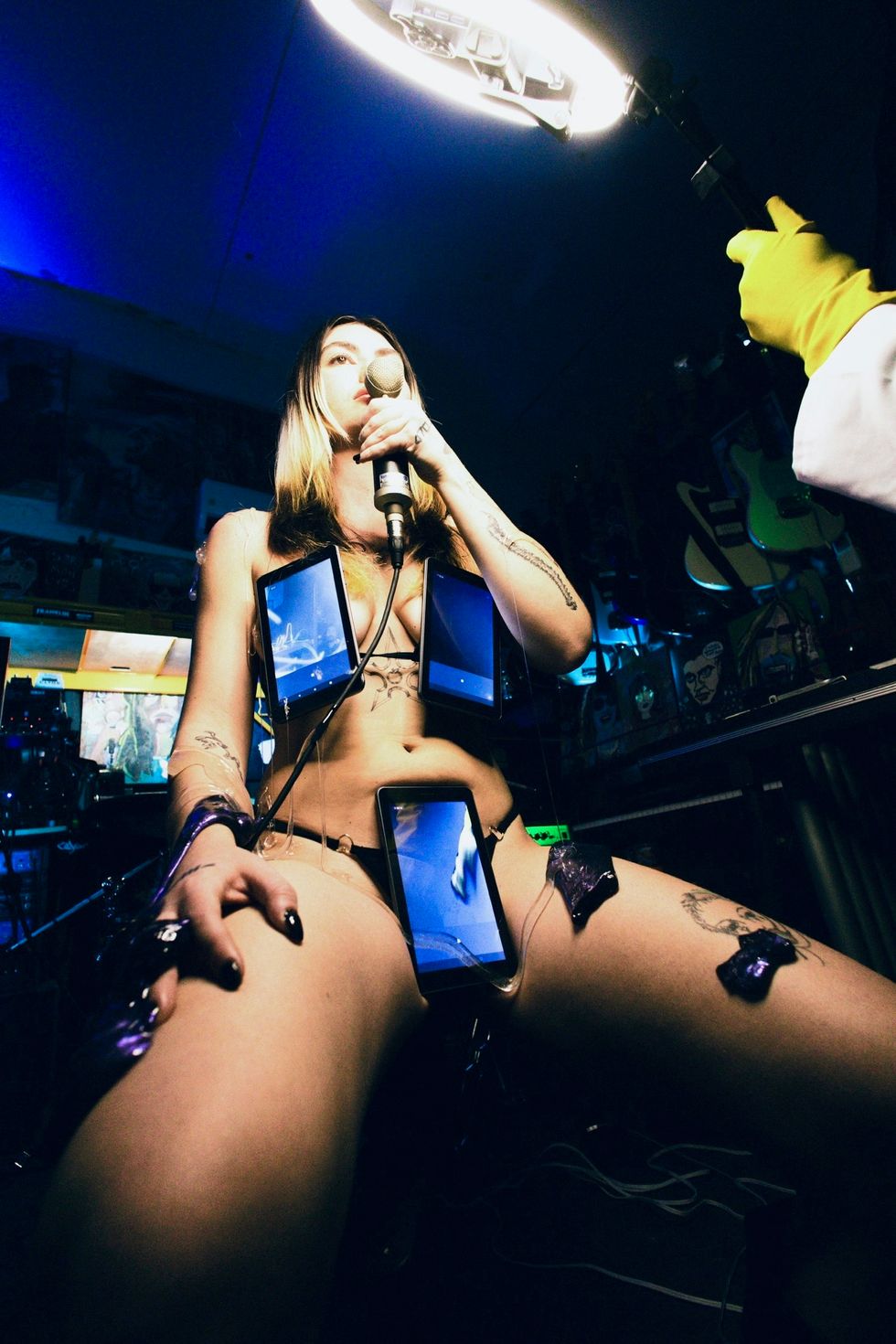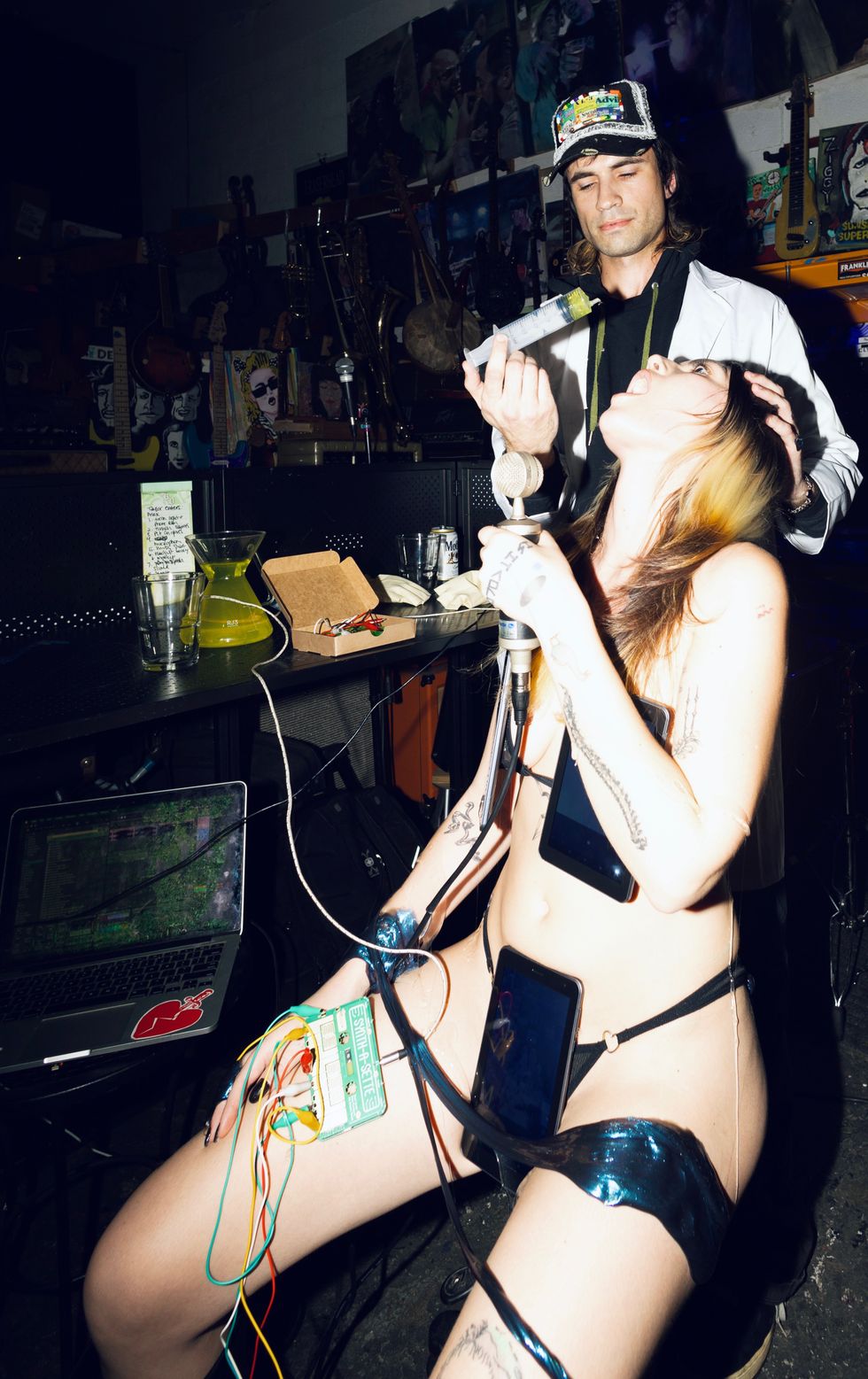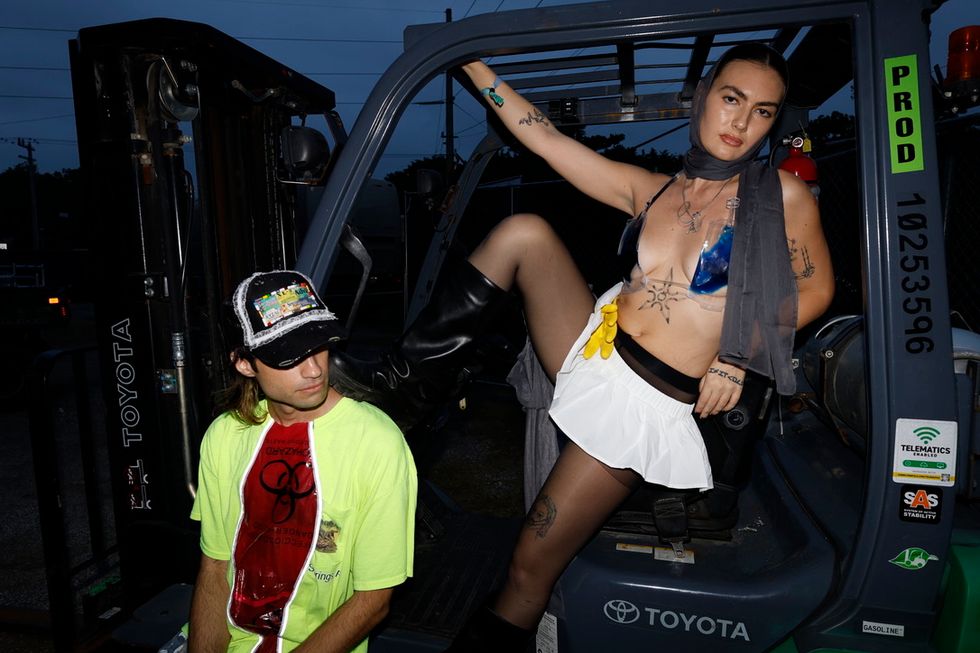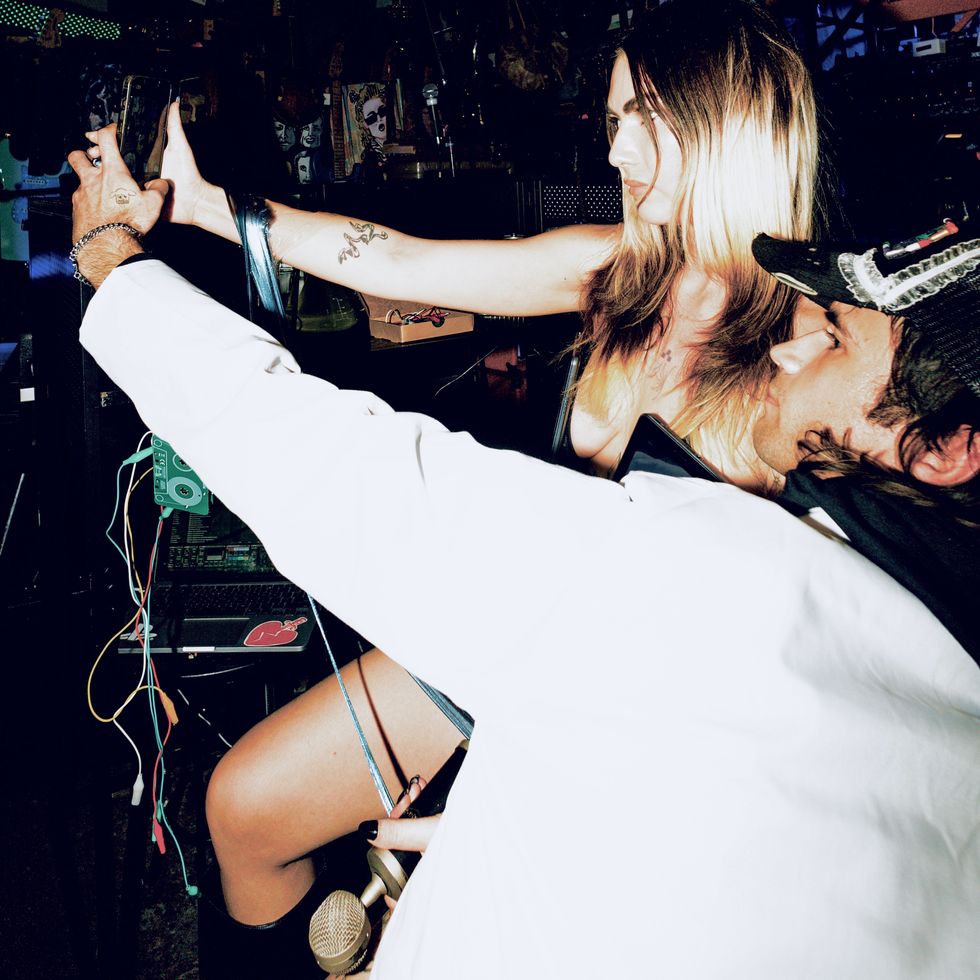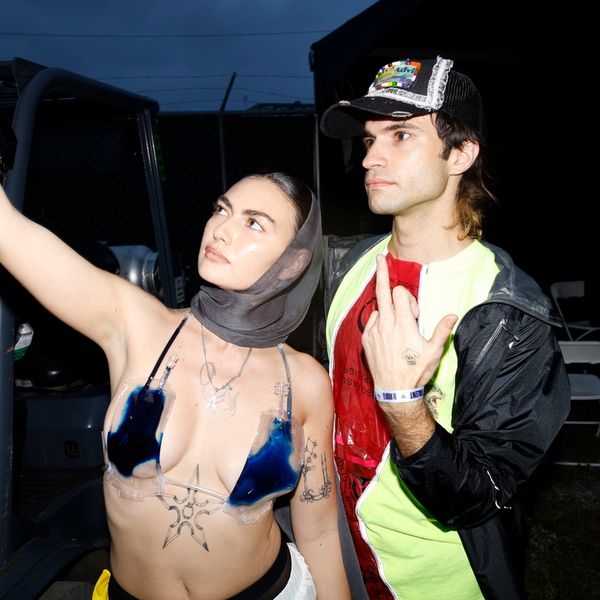
ALLERGi on Cobrasnake Mentorship and Midwest Lab Rat Music
By Janae McGee
Jan 07, 2025
What does it mean to be "Midwest lab rats?" For ALLERGi, the duo made up of performers Chrome and Alex — it’s about where they and their first musical aspirations came from. “It’s like middle of nowhere, meth lab vibes, that’s where we come from. We never leave,” Alex says. “A lot of industrial, brutalist influence too,” Chrome adds. “I was born on the south side of Chicago, so I spent a lot of time surrounded by run-down cornfields and industrial plants. Always going back to those spaces combined with me always trying to mix chemicals felt fitting.”
ALLERGi, who are now based in Miami, have been happy to push sonic and performance boundaries, with Chrome recently donning a bikini made of devices on stage and dressing as an electronic keyboard. As Alex puts it, “If something interesting isn’t happening at a show, I’m bored,” and, “Going to watch a DJ play music on CDJs is cooked.” The outfit’s echoing, trembling track “HUPPi GUPPi” gives a sneak peek into their creative prowess and process. Chrome — who is also pursuing her PhD in neuroscience — says of the kinetic, beat-heavy feat that it’s actually “about me trying to run away from these things by just getting shit-faced with some people in Miami.” The combination of awareness and escapism is working well for the pair, and although, as Alex says, they're mainly focused on “[exposing] people to new exciting shit,” their acuity and audible imaginativeness is definitely getting grabbing attention.
One set of eyes focused on ALLERGi came from famed party photographer (and recent PAPER cover star) The Cobrasnake, AKA Mark Hunter. After being a fan of his work covering LA in the 2010s, the three hit it off like a house on fire, going to parties together and, for ALLERGi, getting career trajectory-changing advice. “Mark was encouraging us to bring that energy to Miami. Fill that hole in the local scene and grow a community around that,” Alex says.
Below, check out our full interview with ALLERGi, on social media and DJs, PC Music, brain activity and more.
Why do you call yourself the Midwest lab rats?
Alex: It’s like the middle of nowhere, meth lab vibes; that’s where we come from. We never leave.
Chrome: A lot of industrial, brutalist influence too. I was born on the southside of Chicago, so I spent a lot of time surrounded by run-down cornfields and also industrial plants. Always going back to those spaces combined with me always trying to mix chemicals felt fitting.
In addition to ALLERGi, Chrome, you’re also getting your PhD in identity neuroscience. What is "identity neuroscience?" What's your research like?
Chrome: I focus a lot on how developing an idea about the self impacts our environment and vice-versa, mostly with large-scale brain networks. The goal is to understand how brain activity in these circumstances can tell us more about strategies of harnessing the powers of our personal and collective identities.
Neuroscience seems to have a heavy influence on your music. What is that process like?
Alex: We always say Chrome is like the Rick Rubin of ALLERGi. She’s really good at taking all these different inspirations and figuring out how to put everything together. It can be overwhelming sometimes, because I wanna make so many different kinds of music, and there's just so much to sift through. It’s difficult to focus. She helps piece all of these inspirations together and narrate a story from them to bridge that gap between my personal expression and making it something people can connect with.
Chrome: I was actually initially attracted to neuroscience and understanding identity because of my curiosity in patterns of the world. I love the idea that we live in a series of patterns; it's digestible. But yeah, I want to know what makes people come together and what tears them apart, you know, why we’re drawn to certain experiences and disgusted by others. I’ve also seen a lot of the horrific flaws and potentials that go on behind the scenes in scientific research and I think the tragedies and possibilities of the future of science and AI have really driven a lot of my inspiration.
What have been some tragedies and potentials you've experienced so far?
Chrome: I’d say one of the biggest ones has to do with the intolerance and hypocrisy of the people in academic research. Academia is just that, another industry, and they are definitely the most delusional system when it comes to admitting that. "HUPPi GUPPi," the last song we put out, is actually about me trying to run away from these things by just getting shit-faced with some people in Miami. I’m just so sad at the loss of philosophy and arts in science. I don't think we are truly going to make any real humanitarian advancement, especially with AI, until we can allow scientists to actually think and feel instead of just producing constantly. I mean, I could go on.
Alex: It’s easy to get jaded.
Do you feel like ALLERGi is an attempt to bring back thinking and feeling into science?
Alex: I think we’re just using the ALLERGi as a way to expose people to new, exciting shit.
Chrome: For sure, I guess I hadn't really thought about it that way until now but yeah I really want to research through the lens of all perspectives. Old ass scientists were painting and drawing all the time and they used that to discover the natural world. Now it's just about mass production. I also think it's probably an attempt to have a conversation with people about these thoughts and feelings in the future of technology and art. I feel like we live in a really liminal space right now, especially when it comes to these issues.
Chrome: Definitely.
Alex: Fuck, I hate talking about this shit cause I get depressed. Aliens are here telling us we’re fuckin shit up and we’re not making changes? We gotta start taking this shit seriously. Yeah, fuck AI.
Why do you choose to go a more performance art route in your live sets?
Chrome: We try to think about every component of how to share and have these conversations, so I try to make garments, bring in props, and create a set design that really has a solid through line. I want to take people on a journey with me. I think it's really a response to the lack of awareness I’ve been experiencing in my research world. I'm just so fed up with the delusion.
Alex: I love it cause if something interesting isn’t happening at a show I’m bored. Going to watch a DJ play music on CDJs is cooked.You said that your last performance was a call to the over-saturation and over-sharing of DJ and influencer culture, and while watching, it’s clear how technologically dystopian all the audio and visual components were. How did you end up choosing the components?
Chrome: I mean there’s DJ’s and influencers everywhere, they’ve crossed every medium of life. Work, play, sleep, the binaural beat DJ guys. And they’re synonymous. They share a common identity of creating this technological, spiritual utopia. “How social media can bring us all together in this perfect little society,” like PLUR or something. Like it's great in theory, but it doesn't really seem like DJ-influencers who are talking in this way are really acting on it, so I guess I feel like I wanted to call them out on their shit.
Alex: We tried to find the most fucked up gear possible. Exposed wires and shit. We found this cool analog synth that you can play using conductive objects. So, we turned Chrome into the keyboard. The venue was this warehouse that’s filled with all these weird old instruments and one-of-one punk and hardcore records from south Florida. We’re drawn to fucked up things.
Kinda like that new schizophrenic production Jamie xx has been talking about. Is the process as chaotic as the sound is? How does being in a relationship affect your creative process?
Chrome: Hell yeah, the more chaos the better. I usually come in super hot with an idea, Alex always calls me a bulldozer. I'm working on that lol trying to turn it into more of a positive. And then it almost feels like he harnesses that energy into the song. Even when we're working with other people, he can really transform, not only the references you use but even the energy you bring into a raw feeling through the music.
Alex: Our process is mostly us fighting until we have something we both think is fine.
And now you guys seem to be moving into more traditional pop sounds. What’s that shift been like? What do you think makes a good pop album?
Chrome: For me, it was a challenge. You can't break them until you fully know them, I guess. The icons are iconic for a reason. People like Bjork and Vivienne Westwood really set a standard of crushing the norm through being in the norm, that to me is real pop and a good mindset for making pop music.
Alex: Yeah it’s dope, pop music is sick.
How did you all meet Mark, AKA The Cobrasnake?
Chrome: Random DM! He posted on his story about being in Miami, where we live now, and I was like, "Ayyy let's link." He got me and my friends on a party list and then literally weeks later he was in town shooting for iiiPoints. He met Alex then and we all spent the whole weekend together lounging around our tiny ass one bedroom apartment and then staying out all night at the festival. I think that weekend really changed a lot for us, like ALLERGi.
Alex: We talked a lot about the LA party scene in the 2010s. There were these sick shows at Cinespace where they would get artists who were in town to play an afterparty and they would always be super hype. There were more people in line than at the actual show. Mark was encouraging us to bring that energy to Miami. Fill that hole in the local scene and grow a community around that.
What do you think changed for you that weekend?
Chrome: There was just a lot of downtime, so we would just hang out and talk until then. He has always been super supportive and I remember at one point we were talking about not really knowing what's next for us and thinking about if we should move or not and I remember him just saying to stick with our weird friends and get crazier and louder with them and then I was just like “Yeah fuck it I'm just gonna push this as psychotically as possible and then more."
With trends like the shuttering of PC Music and the Y2K trend revival being longer than Y2K itself, how do you suppose we cure the culture of its nostalgia addiction?
Chrome: I think we really just need to have some deep reflection together, nostalgia is really just escapism which is fun but it doesn't allow for innovation.
And on top of all of this, you also make your own clothes.
Chrome: it's all part of the same path for me. I make clothes, but it's to tell a narrative with music and performance and science.
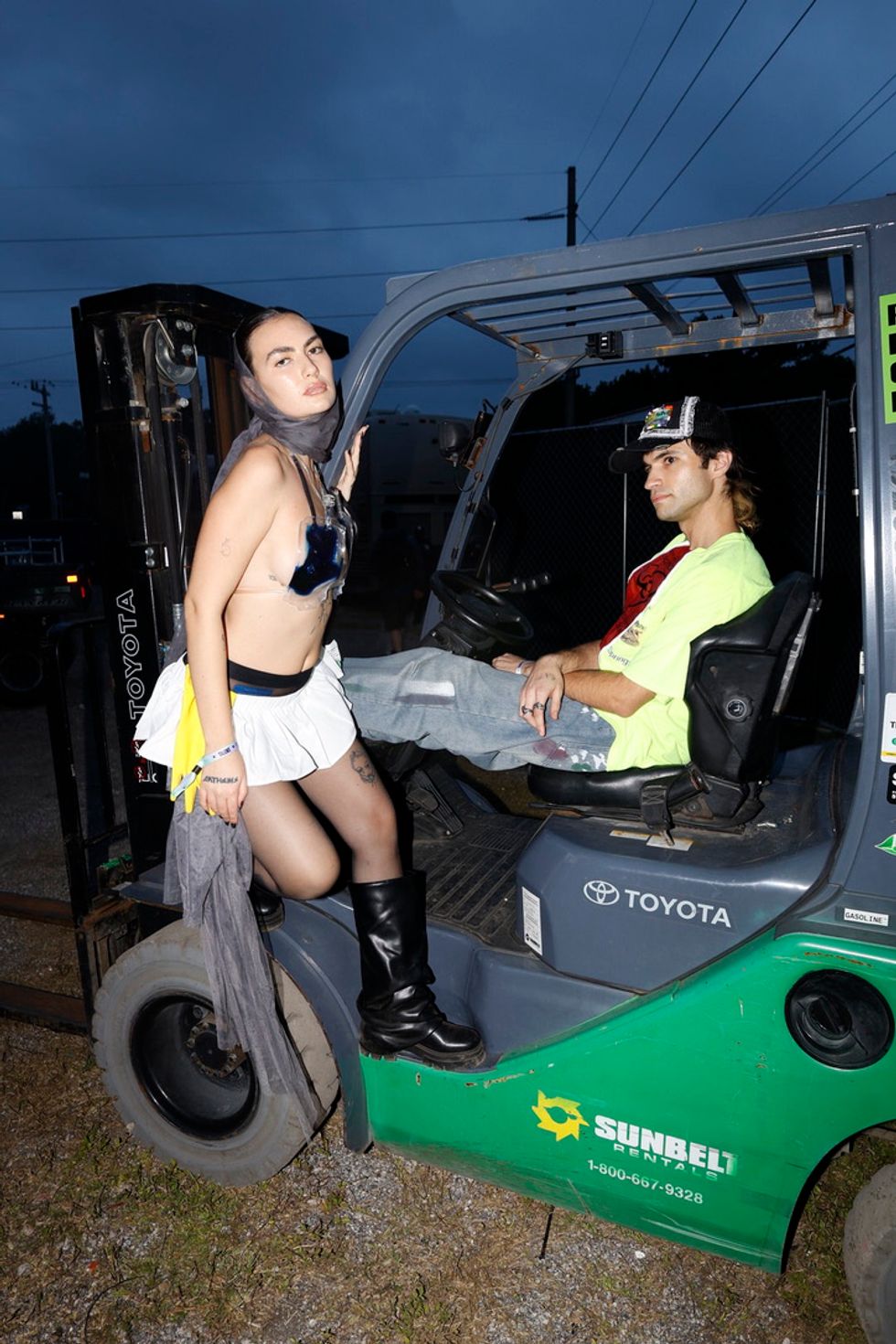
Photography: The Cobrasnake / liljadephotos
From Your Site Articles
- The Cobra Snake Takes On NYFW Nightlife ›
- III Points Music Festival Performers Celebrate Their Latinx Heritage ›
Related Articles Around the Web
MORE ON PAPER
Entertainment
Dove Cameron and Avan Jogia Broke Their Molds
Photography by Gustavo Chams / Story by Joan Summers
Photography by Gustavo Chams / Story by Joan Summers
18 February
ATF Story
Madison Beer, Her Way
Photography by Davis Bates / Story by Alaska Riley
Photography by Davis Bates / Story by Alaska Riley
16 January
Entertainment
Cynthia Erivo in Full Bloom
Photography by David LaChapelle / Story by Joan Summers / Styling by Jason Bolden / Makeup by Joanna Simkim / Nails by Shea Osei
Photography by David LaChapelle / Story by Joan Summers / Styling by Jason Bolden / Makeup by Joanna Simkim / Nails by Shea Osei
01 December
Entertainment
Rami Malek Is Certifiably Unserious
Story by Joan Summers / Photography by Adam Powell
Story by Joan Summers / Photography by Adam Powell
14 November
Music
Janelle Monáe, HalloQueen
Story by Ivan Guzman / Photography by Pol Kurucz/ Styling by Alexandra Mandelkorn/ Hair by Nikki Nelms/ Makeup by Sasha Glasser/ Nails by Juan Alvear/ Set design by Krystall Schott
Story by Ivan Guzman / Photography by Pol Kurucz/ Styling by Alexandra Mandelkorn/ Hair by Nikki Nelms/ Makeup by Sasha Glasser/ Nails by Juan Alvear/ Set design by Krystall Schott
27 October
